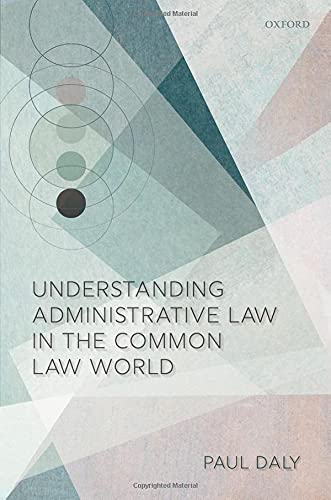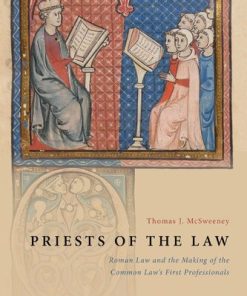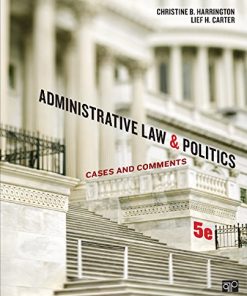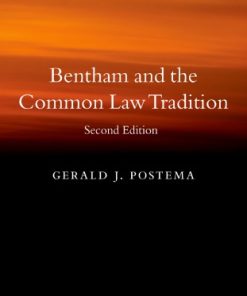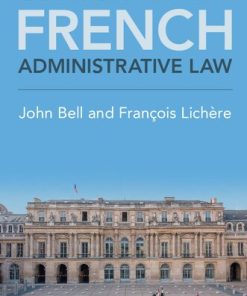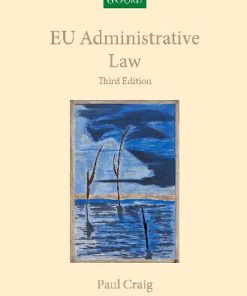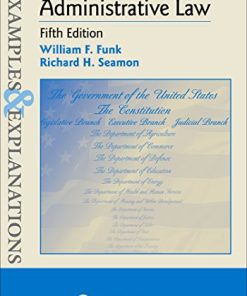(EBOOK PDF)Understanding Administrative Law in the Common Law World 1st edition by Paul Daly 9780192650870 0192650874 full chapters
$50.00 Original price was: $50.00.$25.00Current price is: $25.00.
Understanding Administrative Law in the Common Law World 1st edition by Paul Daly – Ebook PDF Instant Download/Delivery: 9780192650870, 0192650874
Full download Understanding Administrative Law in the Common Law World 1st edition after payment
Product details:
• ISBN 10:0192650874
• ISBN 13:9780192650870
• Author:Paul Daly
Understanding Administrative Law in the Common Law World
Around the common law world, the law of judicial review of administrative action has changed dramatically in recent decades, accelerating a centuries-long process of incremental evolution. This book offers a fresh framework for understanding the core features of contemporary administrative law. Through comparative analysis of case law from Australia, Canada, England, Ireland, and New Zealand, the author develops an interpretive approach by reference to four values: individual self-realisation, good administration, electoral legitimacy, and decisional autonomy. The interaction of this plurality of values explains the structure of the vast field of judicial review of administrative action: institutional structures, procedural fairness, substantive review, remedies, restrictions on remedies, and the scope of judicial review. Addressing this wide array of subjects in detail, the book demonstrates how a pluralist approach, with the values being employed in a complementary and balanced fashion, can enhance our understanding of administrative law. Furthermore, such an approach can guide the future development of the law of judicial review of administrative action, a point illustrated by a careful analysis of the unsettled doctrinal area of legitimate expectation. The book closes by arguing that the author’s values-based, pluralist framework supports the legitimacy of contemporary administrative law which, although sometimes called into question, facilitates the flourishing of individuals, of public administration, and of the liberal democratic system.
Understanding Administrative Law in the Common Law World 1st Table of contents:
Title Page
Copyright Page
Dedication
Contents
Table of Cases
1. A Values-based Approach
1.1 Background
1.1.1 Historical Development and Procedural Reform
1.1.2 Contemporary Debates
1.1.3 Administrative Law Today
1.2 Four Values
1.2.1 Individual Self-realisation: Protecting Individual Interests
1.2.2 Good Administration: Avoid Compromising Effective and Efficient Public Administration
1.2.3 Electoral Legitimacy: Respecting the Roles of Elected Representatives
1.2.4 Decisional Autonomy: Maintaining Distinct Roles for Courts and Administrative Decision-makers
1.2.5 Structure: Complementarity and Balance
1.3 Interpreting Administrative Law
1.4 Comparative Administrative Law
1.5 Pluralist Administrative Law
1.6 Overview
2. Institutional Structures
2.1 The Structure of the No-Bias Principle
2.1.1 Waiver
2.1.2 De Minimis Exception
2.1.3 Elected Officials
2.1.4 Principle of Necessity
2.2 Determinations as to whether Conduct Leads to Bias
2.2.1 Prior Knowledge
2.2.2 Statutory Authorisation
2.3 Retention of Discretion
2.3.1 The No-Delegation Principle
2.3.2 The Carltona Exception
2.3.3 Fettering of Discretion
2.4 Conclusion
3. Procedural Fairness
3.1 The General Structure of the Duty of Fairness
3.2 Exceptions to the Duty of Fairness
3.2.1 Legislative Decisions
3.2.2 Emergencies
3.2.3 Legislative Ouster
3.3 Procedural Fairness Rights
3.3.1 Scope of Procedural Fairness
3.3.2 Notice and Comment
3.3.3 Oral Hearing
3.3.4 Cross-examination
3.3.5 Rules of Evidence
3.3.6 Legal Representation
3.3.7 Reasons
3.4 Conclusion
4. Substantive Review
4.1 Jurisdictional Issues
4.1.1 Electoral Legitimacy and Decisional Autonomy
4.1.2 Good Administration
4.1.3 Individual Self-realisation
4.1.4 Deference on Questions of Law
4.2 Abuse of Discretion
4.2.1 Contemporary Characteristics
4.2.2 Variation in the Range of Reasonable Outcomes
4.2.3 A Note on Reasoned Decision-making
4.3 Relevancy and Propriety
4.4 Conclusion
5. Remedies
5.1 The Broad Scope of Declaratory Relief
5.2 Certiorari and Decisional Autonomy
5.3 Judicial Reluctance to Grant Prohibition
5.4 The Limited Scope of Mandamus
5.5 Injunctive Relief
5.6 Refusal of Relief
5.6.1 Starting Point: A Remedy Should be Provided
5.6.2 The Discretionary Nature of Judicial Review Remedies
5.6.3 Principled Grounds for Withholding a Remedy
5.7 Severance
5.8 Conclusion
6. Restrictions on Remedies
6.1 Procedural Requirements
6.2 Exhaustion of Alternative Remedies
6.3 Collateral Attack
6.4 Exclusion of Review
6.5 Ripeness and Prematurity
6.6 Standing
6.7 Conclusion
7. Scope of Judicial Review of Administrative Action
7.1 Scoping the Scope of Judicial Review
7.2 Electoral Legitimacy
7.2.1 Democratic Nexus
7.2.2 Commercial Activities
7.2.3 Statutory Obligations
7.3 Good Administration
7.3.1 Codes of Practice
7.3.2 Deference
7.4 Decisional Autonomy
7.4.1 An Exclusionary Rule
7.4.2 Contractual Powers and Public Purposes
7.4.3 Accountability Gaps and Individual Interests
7.5 Individual Self-realisation
7.6 Conclusion
8. Legitimate Expectation
8.1 The Plurality of Legitimate Expectation
8.2 Administrative Law Values in the Decided Cases
8.2.1 Abuse of Power
8.2.2 Good Administration
8.2.3 Individual Self-realisation
8.2.4 Electoral Legitimacy and Decisional Autonomy
8.3 A Pluralist Approach to Legitimate Expectation and Administrative Law Values
8.4 Protecting Legitimate Expectations: Pluralism in Action
8.4.1 Knowledge and Reliance
8.4.2 Substantive Legitimate Expectations
8.4.3 Ultra Vires Representations
8.5 Conclusion
9. Defending Administrative Law
9.1 Fit
9.2 Transparency
9.3 Coherence
9.4 Morality
9.4.1 Legitimacy
9.4.2 The Moral Character of Contemporary Administrative Law
9.5 Conclusion
Index
Read More
People also search for Understanding Administrative Law in the Common Law World 1st:
understanding administrative law in the common
what are the basic principles of administrative law
list of administrative law cases
explain administrative law
understanding administrative law
Tags:
Understanding Administrative,Law in the Common,Paul Daly
You may also like…
History - European History
Jurisprudence & Law
Jurisprudence & Law
Contemporary French Administrative Law 1st Edition John Bell
Languages - General & Miscellaneous Languages - Reference
Jurisprudence & Law - Constitutional Law
Jurisprudence & Law - Constitutional Law


